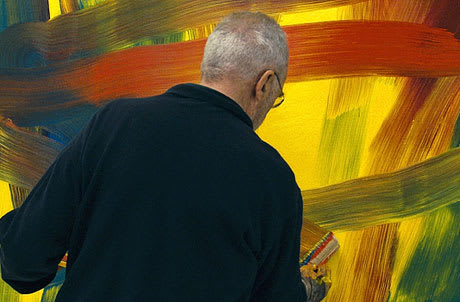In describing his approach to painted work, Gerhard Richter explains the impulse as increasingly confining, insomuch as a work needs to be manipulated as long as there is room for improvement or change until doubt is satiated and mere limitation prescribes completion. It's a method documented in the literally titled Gerhard Richter ― Painting, a surprisingly compelling and unpretentious look at the creative motivations and day-to-day life of one of the most celebrated living artists.
Occasionally pausing for a brief question session, Corinna Belz's minimalist doc observes Richter creating an abstract work from blank canvas to possible completion, revealing the various stages and images his smeared squeegee technique brings to life. He equates the process to being in a hospital, noting how deeply personal the act of painting is, as juxtaposed with the awkward, self-conscious feeling of being filmed.
It's exceedingly candid, as are the questions by Belz, who has no problem asking him to explain why he feels one work is superior to the other when they both look exceedingly similar. He articulates notions of openness and feeling while explaining the process of returning to a piece after some time passes to see if it still holds up as a valid effort or requires reworking.
What's interesting is the notion of doubt, since Richter is quite candid about his ambivalence and gut instinct process, occasionally talking about destroying a work out of frustration and actually whitewashing one piece when it proves unsatisfactory.
Some historical context is provided about his escape from East Germany prior to the Berlin Wall rising, as well as his preoccupation with the living space and contextual change of memory in relation to photographs. An installation of his smeared photographic works, wherein he traces an actual photograph and softens the lines or smears the paint to exacerbate its plasticity, proves haunting in relation to his opinions about the limited perspective of a picture and its ever-changing relevance and context throughout time.
While slight, the greatest thing about Belz's documentary is that it doesn't force a theme or convenient story upon its subject, instead viewing his work and approach from a curious but distant eye. Even his politics ― he's noted for creating works about National Socialism ― are left at the curb, in favour of interpretations of the work, which is why this potentially frustrating film manages to work so well.
(Mongrel Media)Occasionally pausing for a brief question session, Corinna Belz's minimalist doc observes Richter creating an abstract work from blank canvas to possible completion, revealing the various stages and images his smeared squeegee technique brings to life. He equates the process to being in a hospital, noting how deeply personal the act of painting is, as juxtaposed with the awkward, self-conscious feeling of being filmed.
It's exceedingly candid, as are the questions by Belz, who has no problem asking him to explain why he feels one work is superior to the other when they both look exceedingly similar. He articulates notions of openness and feeling while explaining the process of returning to a piece after some time passes to see if it still holds up as a valid effort or requires reworking.
What's interesting is the notion of doubt, since Richter is quite candid about his ambivalence and gut instinct process, occasionally talking about destroying a work out of frustration and actually whitewashing one piece when it proves unsatisfactory.
Some historical context is provided about his escape from East Germany prior to the Berlin Wall rising, as well as his preoccupation with the living space and contextual change of memory in relation to photographs. An installation of his smeared photographic works, wherein he traces an actual photograph and softens the lines or smears the paint to exacerbate its plasticity, proves haunting in relation to his opinions about the limited perspective of a picture and its ever-changing relevance and context throughout time.
While slight, the greatest thing about Belz's documentary is that it doesn't force a theme or convenient story upon its subject, instead viewing his work and approach from a curious but distant eye. Even his politics ― he's noted for creating works about National Socialism ― are left at the curb, in favour of interpretations of the work, which is why this potentially frustrating film manages to work so well.




